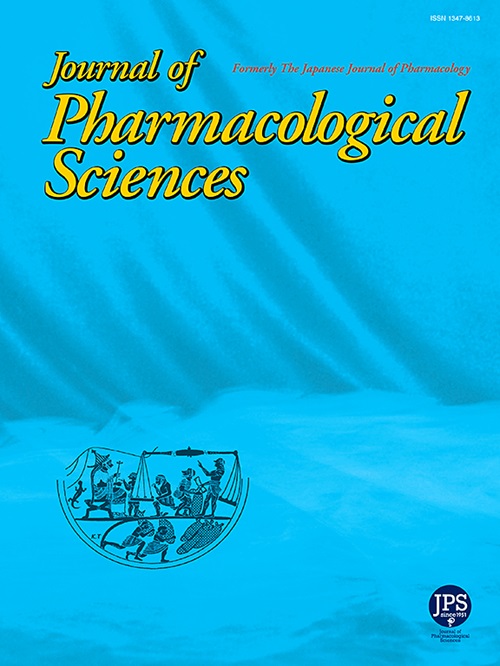HIF-1α stabilization in osteoclasts induces the expression of aerobic glycolysis-related proteins GLUT1, LDHA, and MCT4
IF 2.9
3区 医学
Q2 PHARMACOLOGY & PHARMACY
引用次数: 0
Abstract
Hypoxia-inducible factor (HIF)-1α is a master transcription factor regulating hypoxic adaptation and activates the transcription of genes involved in various steps of energy metabolism. However, some subsets of cancer cells exhibit high HIF-1α levels regardless of the oxygen concentration. Even under normoxic and normoglycemic conditions, HIF-1α regulates basal expression of its target genes. Osteoclasts are giant multinucleated cells derived from the monocyte/macrophage lineage and are specialized in bone resorption. Excessive osteoclast resorbing activities is involved in destructive bone diseases. There are few data regarding how HIF-1α affects osteoclast differentiation. In this study, we investigated whether echinomycin, a HIF-1α inhibitor, reduced the expression of proteins of aerobic glycolysis, such as glucose transporter 1 (GLUT1), lactate dehydrogenase A (LDHA), and monocarboxylate transporter 4 (MCT4), and whether HIF-1α stabilization is involved in osteoclast differentiation. HIF-1α was stabilized earlier than the upregulation of GLUT1, LDHA, and MCT4 expression during osteoclast differentiation. Echinomycin inhibited GLUT1, LDHA, and MCT4 expression. It also inhibited osteoclast differentiation and suppressed osteoclast bone-resorbing activity. We propose that HIF-1α inhibition suppresses excessive osteoclast differentiation and may represent a novel therapeutic strategy for controlling excessive bone resorption in osteoporosis and rheumatoid arthritis.
破骨细胞中HIF-1α的稳定诱导了有氧糖酵解相关蛋白GLUT1、LDHA和MCT4的表达
低氧诱导因子(Hypoxia-inducible factor, HIF)-1α是调控低氧适应的主转录因子,可激活参与能量代谢各环节的基因转录。然而,无论氧浓度如何,某些亚群的癌细胞都表现出高HIF-1α水平。即使在常氧和血糖正常的情况下,HIF-1α也能调节其靶基因的基础表达。破骨细胞是源自单核细胞/巨噬细胞谱系的巨大多核细胞,专门从事骨吸收。过度的破骨细胞吸收活动与破坏性骨疾病有关。关于HIF-1α如何影响破骨细胞分化的数据很少。在本研究中,我们研究了HIF-1α抑制剂echinomycin是否会降低葡萄糖转运蛋白1 (GLUT1)、乳酸脱氢酶a (LDHA)和单羧酸转运蛋白4 (MCT4)等有氧糖酵解蛋白的表达,以及HIF-1α的稳定是否参与破骨细胞的分化。在破骨细胞分化过程中,HIF-1α的稳定要早于GLUT1、LDHA和MCT4表达的上调。紫霉素抑制GLUT1、LDHA和MCT4的表达。它还能抑制破骨细胞分化,抑制破骨细胞骨吸收活性。我们提出HIF-1α抑制过度的破骨细胞分化,可能代表一种新的治疗策略来控制骨质疏松症和类风湿关节炎的过度骨吸收。
本文章由计算机程序翻译,如有差异,请以英文原文为准。
求助全文
约1分钟内获得全文
求助全文
来源期刊
CiteScore
6.20
自引率
2.90%
发文量
104
审稿时长
31 days
期刊介绍:
Journal of Pharmacological Sciences (JPS) is an international open access journal intended for the advancement of pharmacological sciences in the world. The Journal welcomes submissions in all fields of experimental and clinical pharmacology, including neuroscience, and biochemical, cellular, and molecular pharmacology for publication as Reviews, Full Papers or Short Communications. Short Communications are short research article intended to provide novel and exciting pharmacological findings. Manuscripts concerning descriptive case reports, pharmacokinetic and pharmacodynamic studies without pharmacological mechanism and dose-response determinations are not acceptable and will be rejected without peer review. The ethnopharmacological studies are also out of the scope of this journal. Furthermore, JPS does not publish work on the actions of biological extracts unknown chemical composition.

 求助内容:
求助内容: 应助结果提醒方式:
应助结果提醒方式:


